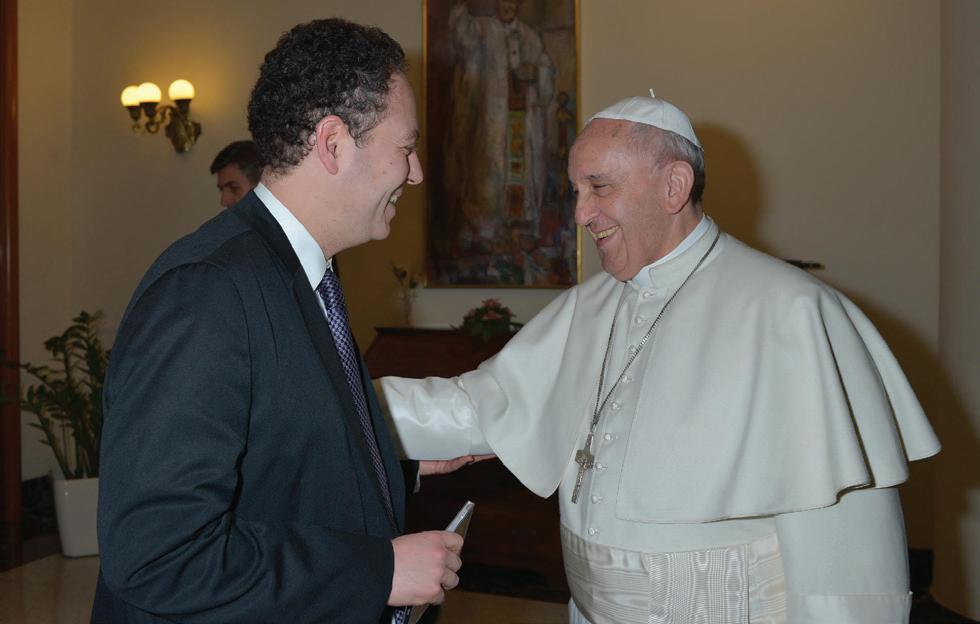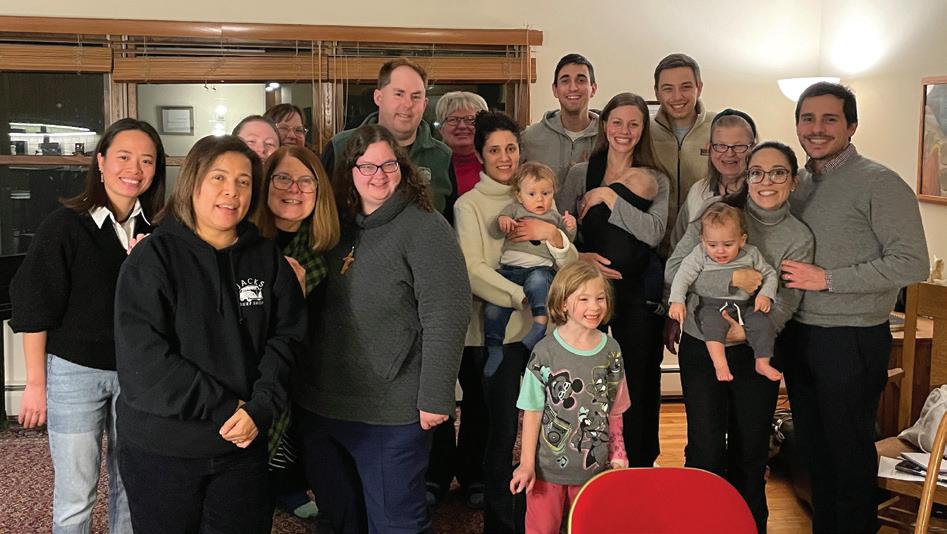
6 minute read
Gaining True Freedom Through Faith and Music
By KAT LARSON
Sebastian Modarelli works at the Co-Cathedral of St. John the Evangelist in Rochester as the director of liturgy and music. He is also active in the Communion and Liberation community established by Fr. Luigi Giussani. Most importantly, he is a man of faith and has always been compelled to follow the will of God.
Sebastian grew up in Buenos Aires, and his faith was fostered by and grown within his family. This strong faith background from his earliest years led him to recognize that God was real. Sebastian's faith journey has been full of many experiences that have only deepened his devotion to the Lord. Sebastian's story is pure proof that if you give your life to the Lord, he can transform it into a living example of the beauty of Christ on earth. Sebastian has demonstrated this through his work with music, but also through living his life in community and writing his own blog.
Sebastian's connection to the Lord, and his desire to seek him, only grew as he matured. He had been living out his faith when he came upon some speeches on liturgical music by Cardinal Ratzinger (Pope Benedict XVI) and realized that Cardinal Ratzinger must have encountered Christ in a way similar to his own. This affirmed how he approached his faith. Sebastian sees it as experiential dynamic as opposed to ideological dynamic. It was a shock when he encountered other people who did not experience God as a real factor of life. When Sebastian was 14 years old, he met boys and girls the same age who professed his same experiences of faith. Any person they met was welcomed, and everyone was important. Sebastian would never have learned the significance of Christ if not for this community, which is known as Communion and Liberation, a movement fully devoted to encountering Christ. He joined Communion and Liberation and has been part of it ever since.
Music was a key influence in Sebastian's life, leading to a closer relationship with Christ. When he was young, he learned to play the piano, then the organ, and was eventually hired at the Buenos Aires major seminary as the organist when he was 22 years old, and later as a sacred music teacher at the introductory seminary.

During our interview, he stated that music was transcendent, and that it was one thing the devil could not take away from us because music holds a direct connection with the infinite. He mentioned key musical compositions that defined his relationship with the Lord. Among the first were the Laude Filipine and the Cantigas de Santa Maria, written by the Christian King Alfonso X of Spain, along with a court of people made of Christians, Jews and Muslims, who all composed this music dedicated to Mary. Sebastian also found inspiration in Gregorian chant, Russian Orthodox music, and other examples of sacred music throughout history. He came to recognize that music was mystery made flesh. This music could not have been written if Christ was not a real fact in history.
Sebastian's heart was once broken by a young lady, and the moment he regained hope in Christ was when he listened to a piece of music written in the late Middle Ages (Tutor dicendo). The beauty of the music allowed him to realize that even though he might not understand why this happened, it was part of his destiny ordained by Christ, and so it was good. His experience with his faith only confirmed his life's involvement with music. Sebastian declared that being a musician requires obeying a force that transcends you. As Christians, we must do the same; we must obey the limits and restrictions of our faith in order to gain true freedom.
During his time at the seminary, Sebastian worked for Pope Francis (then Fr. Jorge Mario Bergoglio) who was serving as Vicar General at the time, later becoming Archbishop of the Archdiocese of Buenos Aires. Sebastian mostly saw him at large liturgical events. He told me that, as Vicar General and then Archbishop, Fr. Jorge Bergoglio was never seen smiling. This was a great surprise considering that in most of the pictures of him as Pope Francis, he is smiling. Sebastian made the point that the Holy Spirit must have inspired a change when Jorge Bergoglio became Pope Francis. What the exact change was, Sebastian does not know.
After finishing his work at the seminary, Sebastian moved to Italy to study at a conservatory for music. He also continued to grow in devotion to God with the Communion and Liberation community, led by Fr. Giussani. Sebastian even had the delightful experience of meeting Fr. Giussani at his home shortly after his last birthday, before he passed away in 2005.
It was after Fr. Giussani's funeral that Sebastian met Monsignor Jerry Mahon, who was attending the funeral. The Co-Cathedral of St. John the Evangelist in Rochester was then in need of an organist, and Monsignor Mahon extended an invitation to Sebastian to apply for this position. During Sebastian's time in the diocese, he has made significant contributions, including improvised music for Bishop Barron's first vespers, a eucharistic processional hymn, and an hour-long choral piece on St. John's Gospel in honor of the 150th anniversary of St. John the Evangelist Church (sebastianmodarelli.com/excerpts-from-what-i-have-seen-and-heard).
Describing these moments during the interview, Sebastian's enthusiasm truly shone forth. He was able to talk openly about the process of his writing and how he needed to obey everything given to him, including inspiration itself, and abide in the Holy Spirit. His face lit up when discussing his blog, the Crow City Post (thecrowcitypost.blogspot.com), a humorous blog which he started last November. His passion for it is clear; another example of Sebastian obeying divine inspiration and allowing it to transcend into a great work.

When asked about what was next in his life, Sebastian said that only God knows, and he is quite content with that. Sebastian is someone who desires to remain in the present moment and to always say "yes" to what is required of him.
Kat Larson is an administrative assistant to the Office of Evangelization in the Diocese of Winona-Rochester. If you know a person in the Diocese of Winona-Rochester who is living out the Catholic Faith in a distinctive way, and who wouldn't mind being featured in The Courier, please email Nick Reller at nreller@dowr.org.







